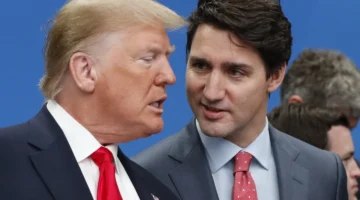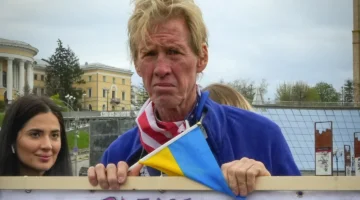S. Korea probes army plan for troops to control protesters
By HYUNG-JIN KIM and KIM TONG-HYUNG, Associated Press
SEOUL, South Korea (AP) — A group of army generals rolling tanks and troops into Seoul to seize power. Paratroopers firing at large crowds calling for democracy. Tanks and armored vehicles stationed at universities to intimidate student protesters.
Such scenes of military intervention in South Korea have been nonexistent since the country achieved democracy in the late 1980s. But revelations this past week of a document showing the military drafted plans to mobilize troops to suppress protests last year have struck a nerve among people in one of Asia’s most vibrant and wealthiest democracies. Some allege the plans even included a scenario for a coup.
The memories of brutal, military-backed dictatorships that imprisoned, tortured and executed dissidents remain vivid to many South Koreans. But most experts say the actual chances for another coup in South Korea are extremely low. A look at the explosive revelations and why a coup is nearly impossible to pull off today:
___
ERUPTION OF SCANDAL
A controversy over the military plans arose last week when a ruling party lawmaker disclosed a document drafted by a military intelligence unit that showed plans to deploy troops if protests grew violent following a court ruling in March 2017 that would determine the fate of conservative then-President Park Geun-hye. Lawmakers had impeached Park over broad corruption allegations in December 2016.
The document written by the Defense Security Command describes a military response to protests both in support of and against Park. After the Constitutional Court ruled to formally remove Park from office, fierce rallies erupted denouncing the court verdict but weren’t serious enough to pose a threat to national security. The plans for troop deployment weren’t carried out.
However, Lim Tae-hoon, an activist who analyzed the document, said the plans were clearly targeted at a much larger group of anti-Park protesters, who poured onto the streets in their millions to passionately but peacefully call for Park’s ouster.
Pointing out that the document included plans for martial law and contemplated how the army could bypass the military’s normal chain of command to quickly deploy large forces to Seoul, Lim raised suspicions that a closed group of army leaders plotted a coup to increase Park’s powers if she survived the attempt to oust her.
“There was no reason at all for the army to prepare plans to deploy troops and even consider martial law,” Lim said.
Following a public outcry, Park’s liberal successor, Moon Jae-in, who won the presidential election in May last year, ordered an investigation into the document. Baek Hye-ryun, a lawmaker from Moon’s party, said it would have been “no different than a coup” if army leaders had plotted to use drastic measures to crack down on anti-Park protesters.
Military experts downplay such views. Despite the peaceful nature of the protests, the military is obligated to prepare for exceptional situations where troop intervention is required to maintain order, they say.
Kim Dong-yub, a former South Korean military official, said it’s clear that the creators of the document “were held captive by the past.” Still, it would be excessive to say there were plans for a coup, he said.
“They were ready to make pathetic and frantic efforts to serve their interests if the court had rescued Park’s presidency,” said Kim, now an analyst at Seoul’s Institute for Far Eastern Studies.
___
IS A COUP EVEN POSSIBLE?
None of the five military experts interviewed by The Associated Press believed there was a real chance a coup could happen in 21st century South Korea. “There’s not even a 0.1 percent chance for that,” said Kim Taewoo, former president of the Korea Institute for National Unification in Seoul.
Here’s why experts find a coup virtually impossible:
__ Ubiquitous smartphones and internet services in South Korea would make it extremely difficult for rebels to keep their coup plans confidential and sneak troops to large population areas. South Korea is one of the world’s most wired nations, with about eight out of every 10 citizens having smartphones.
__ Coup forces would try to seize TV stations and newspapers to dictate the flow of information and force their message to the public. But that’s much harder to do in the age of live streams on Facebook, Twitter and YouTube.
__ Tanks and other military vehicles mobilized by coup forces would probably never reach Seoul in time, bogged down by the metropolitan area’s notorious traffic.
__ Most importantly, many young soldiers and officers, born and raised in a full-fledged democracy, likely wouldn’t follow orders if their commanders turn against their own citizens.
“The sense of citizenship by our soldiers is totally different from the past. If they got an unjust order to point their guns at their own citizens, not at North Korea, I doubt they would follow such orders,” said Seoul-based military expert Kim Dae-young.
South Korea has more than 600,000 troops, a majority of them men in their 20s drafted into a two-year mandatory service.
__
PAST MILITARY RULES
The fierce public reaction to the document is partly tied to Park’s family history. She is the daughter of staunch anti-communist dictator Park Chung-hee, a late general-turned-autocrat who ruled South Korea for nearly 20 years before he was assassinated by his own spy chief in 1979.
Park Chung-hee led several thousand marines, paratroopers and other combat forces that moved into Seoul in the early hours of May 16, 1961, in the country’s first successful coup. During his rule, he occasionally proclaimed martial law and other decrees to crack down on protests and jail critics.
He had previously survived two attempts on his life and justified his dictatorship with the threat posed by what he called belligerent North Korea. Proponents remember him as a hero who achieved a rapid industrialization and lifted the nation from the devastation of the 1950-53 Korean War, but opponents call him a ruthless leader with a bloody record of civilian oppression.
Less than two months after Park Chung-hee’s death, Maj. Gen. Chun Doo-hwan and his military cronies drove tanks and troops into Seoul in December 1979 in the country’s second successful coup. The next year, he orchestrated a brutal military crackdown on a pro-democracy uprising in the southern city of Gwangju, killing at least 200 people.
In the summer of 1987, massive street protests forced Chun’s government to accept direct presidential elections. However, his army buddy Roh Tae-woo, who had joined Chun’s 1979 coup, won the election held later in 1987 thanks largely to divided votes among liberal opposition candidates.
After leaving office, both Chun and Roh were arrested and spent time in prison on bribery, treason and other charges.
___
Follow Hyung-jin Kim at www.twitter.com/@hyungjin1972 and Kim Tong-hyung at www.twitter.com/@kimtonghyung
[livemarket market_name="KONK Life LiveMarket" limit=3 category=“” show_signup=0 show_more=0]




No Comment